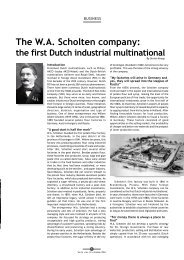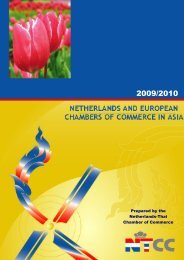December 2009 / January 2010 - Association of Dutch Businessmen
December 2009 / January 2010 - Association of Dutch Businessmen
December 2009 / January 2010 - Association of Dutch Businessmen
You also want an ePaper? Increase the reach of your titles
YUMPU automatically turns print PDFs into web optimized ePapers that Google loves.
Business<br />
Under Chinese management<br />
By Frank Kuijsters<br />
Is there something like a Chinese management<br />
style?<br />
Although the communist Mao Zedong Confucianism<br />
rejected as reactionary and feudal, the influence<br />
<strong>of</strong> the Chinese philosopher’s thoughts and actions<br />
<strong>of</strong> the population never completely disappeared.<br />
Indeed, even during the Cultural Revolution, when<br />
everything that smacked <strong>of</strong> the old China had to<br />
be destroyed, Confucius did affect the thinking<br />
and acting <strong>of</strong> the population. You can’t just erase<br />
25 centuries.<br />
Fundament<br />
The teachings <strong>of</strong> Confucius (551-479 BC) is known<br />
as the cultural foundation <strong>of</strong> China. He is described<br />
as “China’s first master” and has followers in East<br />
Asia. Confucius’ teachings originally transmitted<br />
only orally, but after his death by his students in<br />
writing. More than 1000 years long, to the early<br />
twentieth century, Chinese students were required<br />
to the wisdom and teachings <strong>of</strong> Confucius and<br />
learned by heart at any time could cancel out<br />
loud. The teachings in the Chinese psyche as such<br />
deep scars left as the Judeo-Christian morality<br />
in the western world.<br />
Confucianism is therefore, deliberately or<br />
not, major impact on the management <strong>of</strong> Chinese<br />
enterprises. The Journal <strong>of</strong> Management Studies<br />
in an article in 2007 concluded that the influence<br />
<strong>of</strong> Confucius on Chinese Management wasn’t<br />
estimated for a long time on its true value.<br />
The faster China’s economy develops, the<br />
more the Chinese seem to refer to their history<br />
and important figures <strong>of</strong> the past. The Chinese<br />
economic miracle is leading to a renaissance <strong>of</strong><br />
the ancient Chinese values. At several schools<br />
Confucius is educated again.<br />
“Zesjes” Culture<br />
Anyone who has done business in China will<br />
recognize: the way to a decision or agreement<br />
is long and full <strong>of</strong> bumps (see box ‘10 tips’).<br />
But if a decision has been taken, it also carried<br />
with dizzying speed, without reserve or wailing<br />
afterwards.<br />
It is not only a consequence <strong>of</strong> the top-down,<br />
authoritarian management culture, but it is also<br />
due to the Confucian work ethic. One can accuse<br />
the Chinese <strong>of</strong> many, but they do not lay down a<br />
“zesjes” culture. In addition, both employee and<br />
14<br />
Vol.19 • No. 10 • <strong>December</strong> <strong>2009</strong> / <strong>January</strong> <strong>2010</strong>
















